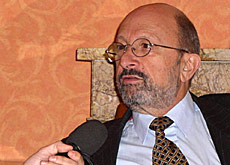Low-cost terrorism proves hard to combat

Swiss experts say attacks like last month’s failed parcel bombs bound for the United States are difficult to prevent, due to the low costs involved in planning such an operation.
The terrorist organisation Al-Qaeda in the Arabian Peninsula (AQAP) said the packages it put aboard freight planes bound for the US were never intended to cause mass casualties, but to create maximum economic damage as part of its “strategy of a thousand cuts”.
The Yemeni-based group said the parcels, which were intercepted in Dubai and Britain, were part of “Operation Haemorrhage” a plan that had cost just $4,200 (SFr4,200) dollars to mount.
Daniel Möckli of the Center for Security Studies (CSS) at the Federal Institute of Technology in Zurich told swissinfo.ch that al-Qaeda has in part been forced to alter its strategy since its ability to carry out large attacks has weakened in the past few years.
Möckli added that “Al-Qaeda is right to say that small – even failed – attacks can have great impact”.
The expert says however AQAP’s claim that the parcel bombs fright would cost the US and other Western nations billions of dollars in new security measures is “exaggerated” even if new security gaps must be closed.
Möckli believes the psychological impact is greater – having to live in constant fear of terrorism.
Sita Mazumder, professor at Lucerne’s University of Applied Sciences, thinks that al-Qaeda’s approach is nothing new, and she would not rule out large attacks in future.
Cost effective
“If you look at the costs, it becomes clear that big strikes can be carried out on relatively modest budgets,“ said Mazumder.
The professor published a book earlier this year in German, Das Geschäft mit dem Terror (The Business of Terrorism), on how al-Qaeda is financed and the cost of its attacks to the global economy.
She concluded in the book that al-Qaeda spent about $500,000 to carry out its 9/11 attacks while the resulting damage added up to $32 billion.
Mazumder based her findings on publicly-accessible data and results of research published in the media. She believes that to combat the terrorism phenomenon it must be understood in all its facets, including monetary aspects.
Transaction monitoring
She chose to focus on this part of the phenomenon after the regulatory authorities, including those in Switzerland, approved measures to make it mandatory for financial institutions to monitor more closely transactions that could be connected to terrorism.
Mazumder says this control function is important but very difficult in practice since only small sums are needed to carry out a modern terrorist attack.
“The 2004 Madrid train bombings cost the terrorists about $10,000, and that was expensive at the time. The [Bishopsgate] bombing in London in 1993 [carried out by the IRA] was only $5,000 and the London attack in 2005 only cost $1,000.”
The expert states that terrorists are also smart enough not to call attention to themselves by making large financial transactions. “We’re talking about individual transactions of a couple of hundred dollars each, or a thousand in the case of 9/11.”
Based on the huge sums of money involved daily in global transactions, she doubts whether even the best monitoring system can uncover money earmarked for terrorists.
Sita Mazumder estimates the cost of the 9/11 attacks at around $500,000, while the damage added up to $32 billion.
Direct costs to the 9/11 terrorists:
Mazumder includes the cost of living such as food and housing for the terrorists as well as everything needed for the planning and carrying out of the attacks such as materials and pilot training. Also included are the payments made to compensate the relatives of the suicide bombers.
Direct damages:
Included are damages to infrastructure such as the loss of the twin towers of the World Trade Center in New York and damage to the Pentagon and costs of the rescue operations, clean up and reconstruction (not yet complete).
Also included in the calculations are the loss of profit and productivity of the companies that had offices in the World Trade Center.
The tourism branch including aviation also suffered a large setback following the attacks.
The professor also took into account the cost to the reinsurance industry, and indirectly a rise in insurance premiums.
(adapted from German by Dale Bechtel)

In compliance with the JTI standards
More: SWI swissinfo.ch certified by the Journalism Trust Initiative











You can find an overview of ongoing debates with our journalists here . Please join us!
If you want to start a conversation about a topic raised in this article or want to report factual errors, email us at english@swissinfo.ch.